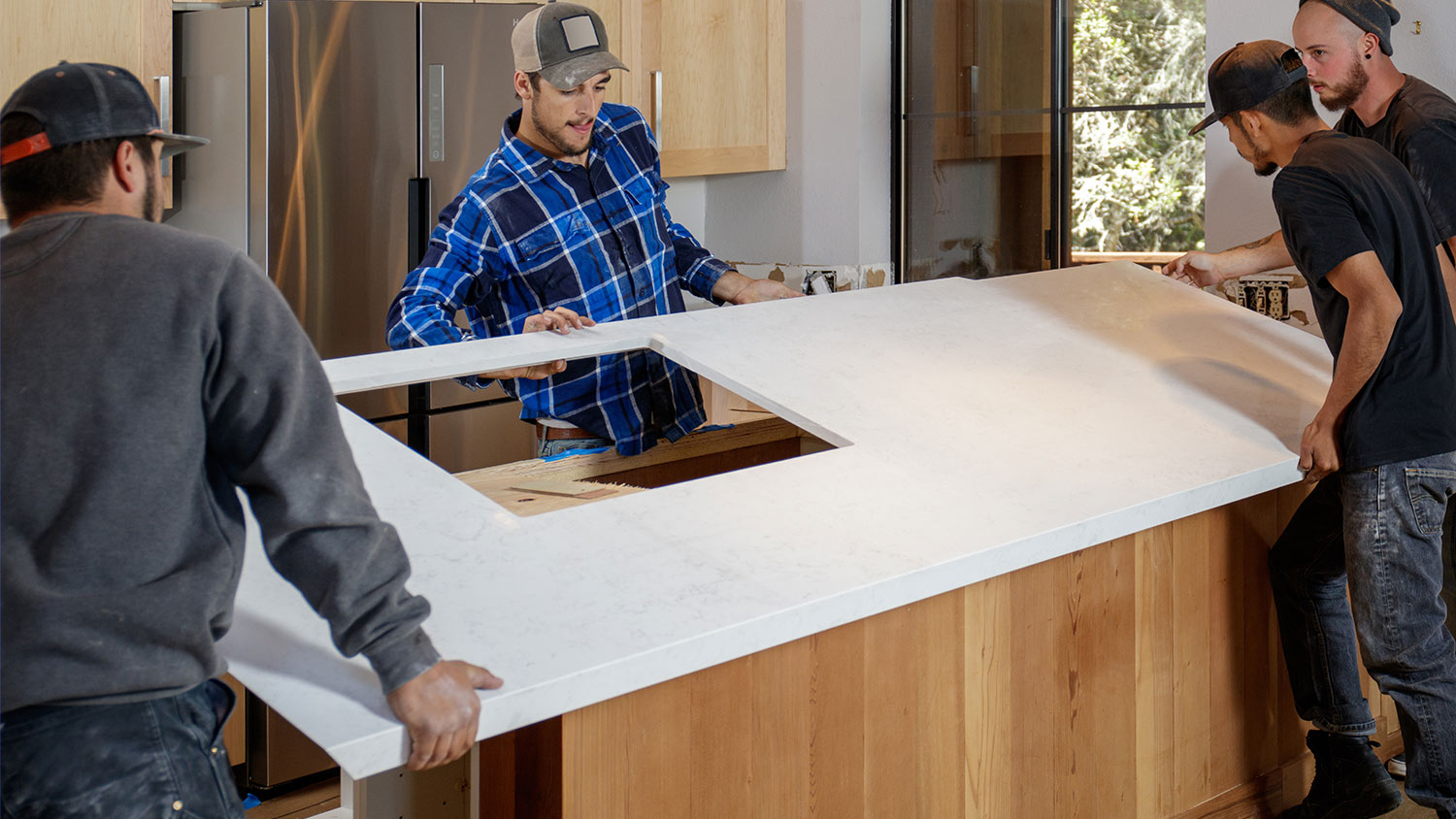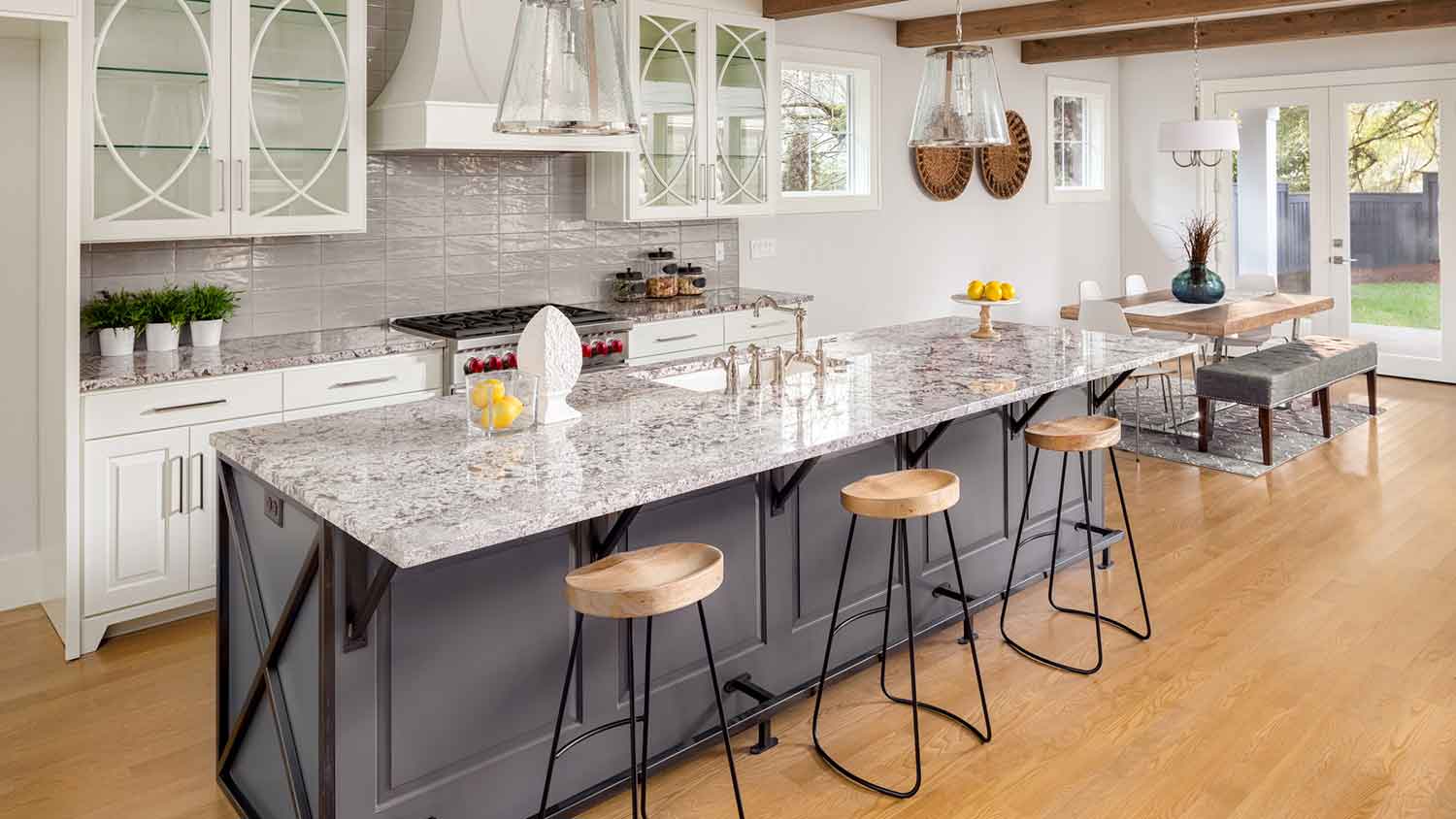
Kitchen islands are multipurpose workhorses in your kitchen. When looking to add one to your home, you should consider its size, materials, and its primary use in your home. Learn about the price of kitchen islands and their different features.
On average, granite countertops cost $3,250, but prices can range from $2,000 to $4,000, depending on the type of granite, size of the countertops, and even the color and texture.


Granite countertop slabs often cost between $40 and $60 per square foot.
Factors affecting the price include the granite size, type of granite, color and rarity, texture, and finish.
You’ll spend about $35 to $85 per hour in labor fees, but professionals get the installation done safely and seamlessly.
Expect to spend an additional $10 to $40 per square foot for upgraded edges.
Don’t forget the disposal of your old countertop, which costs $4 to $7 per square foot.
While you can complete small granite countertop installation projects for under $500, most projects range from $2,000 to $4,000, with an average price of $3,250. That said, if you choose high-end granite for a large counter, the cost can exceed $9,000.
To help homeowners with their next project, Angi provides readers with the most accurate cost data and upholds strict editorial standards. We’ve surveyed thousands of real Angi customers about their project costs to develop the pricing data you see, so you can make the best decisions for you and your home. We pair this data with research from reputable sources, including the U.S. Bureau of Labor Statistics, academic journals, market studies, and interviews with industry experts—all to ensure our prices reflect real-world projects.
On average, a granite countertop slab costs between $40 and $60 per square foot. You’ll pay the most for a large kitchen island, and prices will be lowest for a bar top or small counter.
Here are estimated granite countertop costs based on square footage:
| Project Size and Type | Average Cost |
|---|---|
| Average Size Kitchen (24 x 180) | $1,900–$3,300 |
| Small Counter (24 x 72) | $750–$1,400 |
| Kitchen Island (36 x 78) | $1,000–$2,100 |
| Small Kitchen Island (40 x 40) | $650–$1,200 |
| Bar Top (16 x 36) | $300–$600 |
At $40 to $60 per square foot, granite costs less than some countertop materials (such as marble and stainless steel), but it's more expensive than others (like certain types of quartz and slate). Note, however, that granite can climb to $100 per square foot, depending on the type and quality you choose.
Here’s how granite prices compare with other countertop materials:
| Countertop Material | Average Price per Square Foot |
|---|---|
| Slab of Granite | $40–$100 |
| Granite Tile | $5–$15 |
| Quartz | $15–$70 |
| Quartzite | $55–$75 |
| Marble | $15–$190 |
| Concrete | $50–$100 |
| Butcher Block | $55 |
| Soapstone | $20–$70 |
| Stainless Steel | $50–$250 |
| Slate | $30–$90 |
Costs vary widely depending on granite type, from as low as $30 per square foot for Ubatuba to upward of $100 per square foot for Blue Louise. Common granite types are easier to source and therefore less expensive than rare granite types.
Here’s what you might pay for different types of granite:
| Types of Granite | Average Price per Square Foot |
|---|---|
| Alaska White | $35 |
| Ubatuba | $30–$60 |
| Silver Cloud | $35–$40 |
| Absolute Black | $45–$60 |
| Black Galaxy | $50–$70 |
| Blue Louise | $70–$100 |
| Crema Bordeaux | $80 |
| Solarius | $60 |
| Bianco Antico | $45–$75 |
| Baltic Brown | $8 |
| New Venetian Gold | $45 |
| Costa Esmeralda | $70 |
| New Caledonia | $45 |
| Giallo Ornamental | $50–$55 |
| St. Cecilia | $40 |

When hiring a local granite countertop installer, your estimate will likely break down into two sections: the square footage of materials and an hourly rate for labor. Here are the primary factors that influence the cost of a granite countertop.
Labor: $35 per square foot
Removal and disposal of old countertop: $4–$7 per square foot
Color and rarity: $10 per square foot extra when choosing darker granite countertops over lighter granite countertops
Honed finish: $10–$20 more per square foot
Leathered finish: $15–$25 more per square foot
Style of countertop edges: $10–$40 per linear foot for upgraded edges, such as rounded edge or French cove
Slab delivery: $150–$200, if not included in labor fees
Sink cut-out: $100
Sink installation: $420
Cooktop cut-out: $200 each
Plumbing alterations: $350–$2,000
Caulking over granite seams: $1.25–$4 per linear foot
Painting over granite seams: $6–$15 per square foot
Granite sealing: $100 or more
Warranty: $300+
Granite installation quickly gets expensive, especially with more high-end types of granite, but there are cost-cutting options.
Choose a less expensive type of granite, such as St. Cecilia or Ubatuba, to potentially save 25% to 40% over higher-end options.
Pick up your granite in-store to save on delivery, which often costs $150 to $200.
Go for granite tiles ($5 to $15 per square foot) over slabs ($40 to $100 per square foot).
Choose thinner granite, which will save material costs ($40 to $60 per square foot).
DIY old countertop removal for a savings of $4 to $7 per square foot, but note that it might be heavy.
Are you wondering about the most common countertop materials? Based on the responses of 8,100 Angi customers, 44.6% of homeowners prefer granite, while 29.3% opt for quartz. Granite is valued for its natural beauty and heat resistance, while quartz is prized for its durability, low maintenance, and wide range of color options.
It’s usually best to hire a local granite countertop installation pro, especially if you want a seamless finish. That said, you might be able to DIY in some cases, which will save about $35 to $85 per hour on labor costs. This equates to around $1,500 total for the project.
Here’s when you should hire a pro:
You want a large slab of uninterrupted granite on your counter. Slabs run several hundred pounds, and they can crack or shatter if mishandled
You’re unsure how to do the job. Incorrect granite countertop sealing, grouting, or leveling can cost you more in repairs—and they likely won’t result in a flawless finish.
You want a warranty that covers defects and installation issues, safeguarding your investment in the long run.
Your countertop layout involves complex cuts.
You need to dispose of existing heavy countertops.
The installation requires fitting around sinks, appliances, or backsplashes.
You might DIY in the following situations:
You’re working with granite tile and modular pieces.
You have prior experience with similar projects.
You can get specialized equipment for cutting, sanding, and sealing.
The project is small, such as a bathroom vanity or a small kitchen island.
You’re willing to accept an end result that’s not flawless.
You have help available to assist with lifting and positioning materials safely.
Whether you choose DIY or hire a pro, we recommend hiring a professional fabricator to properly measure and cut your granite pieces.
It’s best to hire a countertop installation pro for this project, especially if you want a seamless finish.
Homeowners might install granite tile and modular pieces themselves, but they should still consult a pro for measuring and cutting granite pieces.
Don’t forget to budget for the disposal of old countertops, sink and cooktop cut-outs, plumbing alterations, sealing, and warranties.
From average costs to expert advice, get all the answers you need to get your job done.

Kitchen islands are multipurpose workhorses in your kitchen. When looking to add one to your home, you should consider its size, materials, and its primary use in your home. Learn about the price of kitchen islands and their different features.

Discover cabinet installation cost estimates, including average prices, key cost factors, and tips to save on your new kitchen or bathroom cabinets.

Explore how much concrete countertops cost to install based on factors like their size, thickness, location, finish, and labor rates.

Installing countertops is grueling work, so leaving a tip for your countertop installers is always an appreciated gesture—but how much depends on the quality of work.

Nonporous kitchen countertops offer many affordable and attractive-looking options while being relatively maintenance-free. Here are six options to consider.

If your countertops are getting old, dull, or showing signs of wear, it may be time to do something. But to refinish vs. replace countertops is the question.